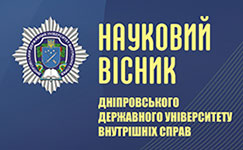Arie ANDRASYAH ISA, Olga OLIYNYK, Alina LUKOMSKA
ANDRASYAH ISA A., OLIYNYK O., LUKOMSKA A. (2023), LEGAL ASPECTS OF TRANSLATOR ACTIVITY IN CRIMINAL PROCEEDINGS AND SOME DIFFICULTIES OF TRANSLATING LEGAL TERMINOLOGY; Scientific Bulletin of Dnipropetrovsk State University of Internal Affairs, № 1, 377-383
DOI: 10.31733/2078-3566-2023-1-377-383
ABSTRACT. The article examines the elements of law related to the activities of the translator in criminal proceedings, analyzes the main factors that complicate its implementation, and also reviews the requirements for the person of the translator in criminal proceedings. The article also raises the problem of translating legal terminology. Legal language is the language of lawyers with their specific terminology and particular linguistic style, which is quite different from everyday language. The translator must know the legal system of the country of the source language, the terminology and style used in this language, as well as have an understanding of the legal system of the country into which the translation is being carried out. Legal documents, along with other types of highly specialized documentation, are among those that are particularly difficult to translate. This is primarily due to the high degree of responsibility placed on the translator for the quality of the work, which requires a high degree of accuracy and correctness of the translation.
The authors emphasized that legal translation has a number of features that the translator of a legal text should be aware of, as mistakes in the translation can lead to conflict between the parties of the legal discourse. This type of translation cannot be carried out without the use of special knowledge in the relevant field of law, or the possibility of obtaining advice from someone who is knowledgeable in this field of activity to which the translated material belongs, because without knowledge of the specifics of a particular type of legal relationship, there is a significant risk of an inaccurate translation, with a large number of connotations, which, in turn, can lead to negative legal consequences. The article summarizes a number of opinions of scientists, as well as an analysis of the norms of the current criminal procedural legislation, which made it possible to make proposals for further improvement of the legal regulation of the translator’s activities in criminal proceedings.
Keywords: criminal procedural legislation, regulatory issues, translator, legal terminology, translation, legal consequences, connotations.
- References:
- Kryminalnyi protsesualnyi kodeks Ukrainy [Criminal Procedure Code of Ukraine] : Zakon Ukrainy vid 13.04.2012 r. URL: https://zakon.rada.gov.ua/laws/show/4651-17#Text. [in Ukr.].
- Rogalska, V. V. (2019) Reglamentatsiya ta realizatsia prava na rereklad u konteksti zabezpechennya spravedlivogo sudochunstva [Regulation and implementation of the right to translation in the context of ensuring a fair trial]. Naukoviy visnik Dnipropetrovskogo derdzavnogo universitetu vnutrishnih sprav. № 2. рр. 151–157. [in Ukr.].
- Kuchunska, O. P. (2010) Perekladach v kriminalnomy protsesi Ukrainu. [Interpreter in the criminal process of Ukraine] : tezy Mizhnarodnoi naukovoi konferentsii «Problemy yurydychnoi kvalifikatsii (teoriia i praktyka)». P. 139-141. [in Ukr.].
- Loboda, U. A. (2018) Perekladach u kriminalnomy provaddzeni: terminologichna nevuznachenist ta problemu kompetentnosti [Interpreter in criminal proceedings: terminological uncertainty and issues of competence]. Science and Education a New Dimension. Philology, VI (53). Issue : 182. Nov. рр. 33–35. [in Ukr.].
- Kuzik, T. M. (2013) Ponatya ta vimogi do osobi perekladacha u kriminalnomy protsesi Ukrainu [The concept and requirements for the person of the translator in the criminal process of Ukraine]. Universutetski naukovi zapysky. № 1(45). рр. 341–346. [in Ukr.].
- Sorokina, G. M., Tomah, T. I. (2015) Osoblivosti pereklady yuridichnoy terminologiy [Peculiarities of translation of legal terminology] : materialy Vseukrainskoi naukovo-prakt. konf. z mizhnarodnoiu uchastiu «Terminolohichni problemy perekladu ta navchannia fakhovykh mov» (m. Kharkiv, 11 bereznia 2015 r.). Kharkiv : Natsionalniy uridichniy universitet im. Yaroslava Mudrogo. рр. 85–87. [in Ukr.].
- Karaban, V. I. (2001). Pereklad naukovoy ta tehnichnoy literaturu : leksuchni, terminologicni ta dzanrovo-stulistuchni trudnoschi [Translation of English scientific and technical literature: lexical, terminological and genre-stylistic difficulties]. Vinnitsa : Nova kniga. P. 2. 304 p. [in Ukr.].
- Oliynyk, O. (2019) Ways of defining level of trust: how do semiotics and hermeneutics influence such notions as trust and confidence, belief? Ukraine’s European integration choice and macroeconomic problems: materials of the International scientific and practical conference of young scientists and students: (Dnipro, December 5, 2019). Dnipro : University named after Alfred Nobel. 476 p.
